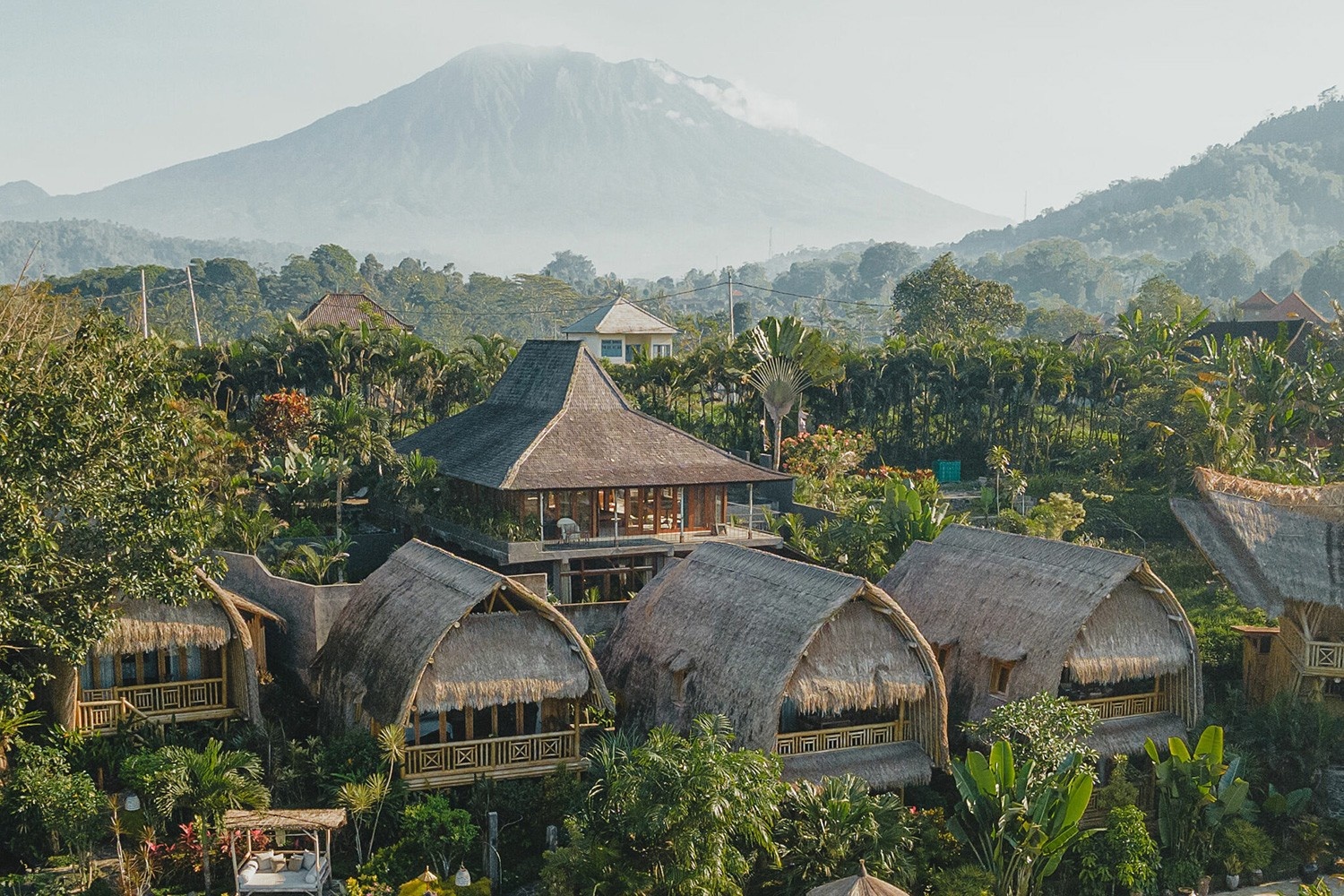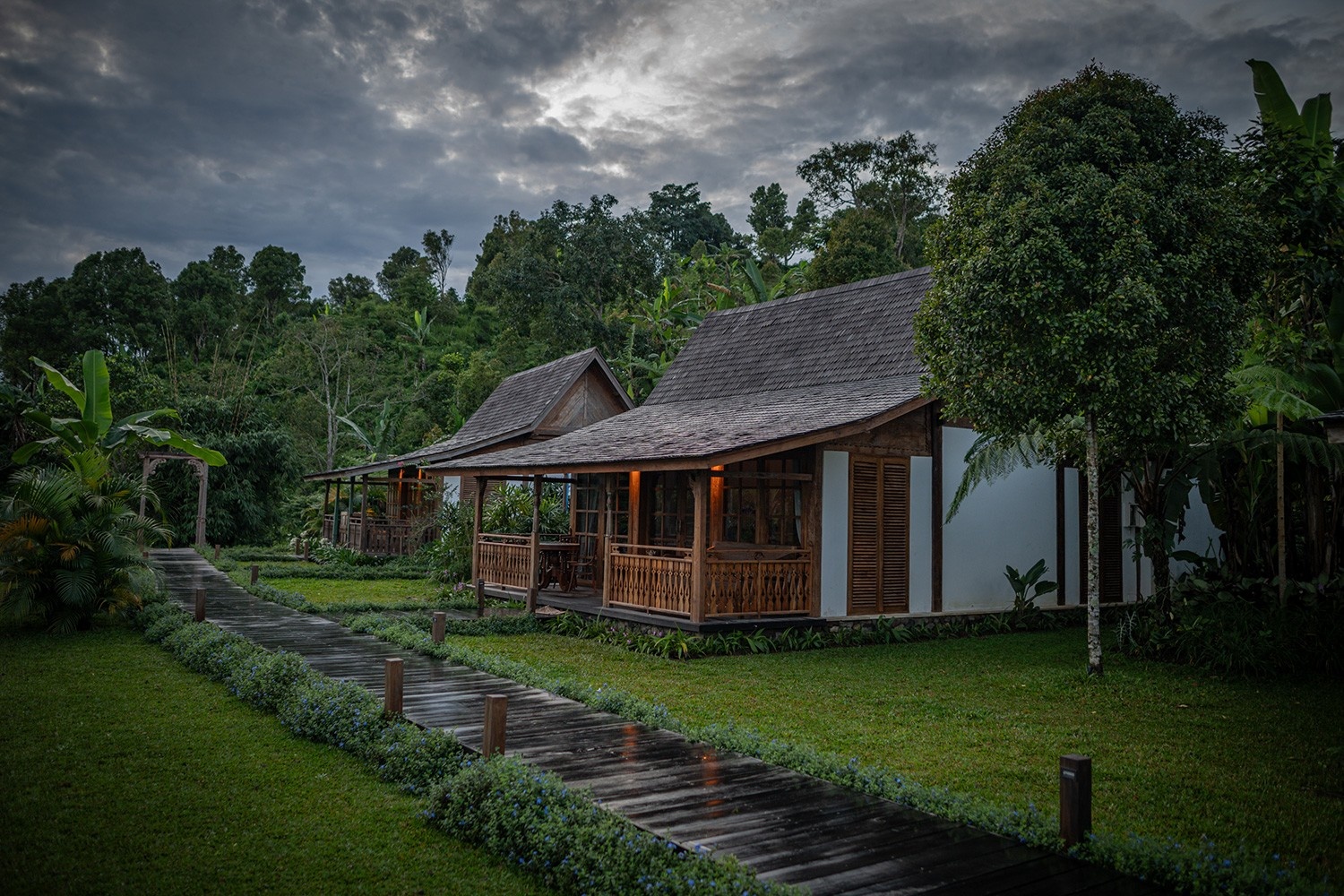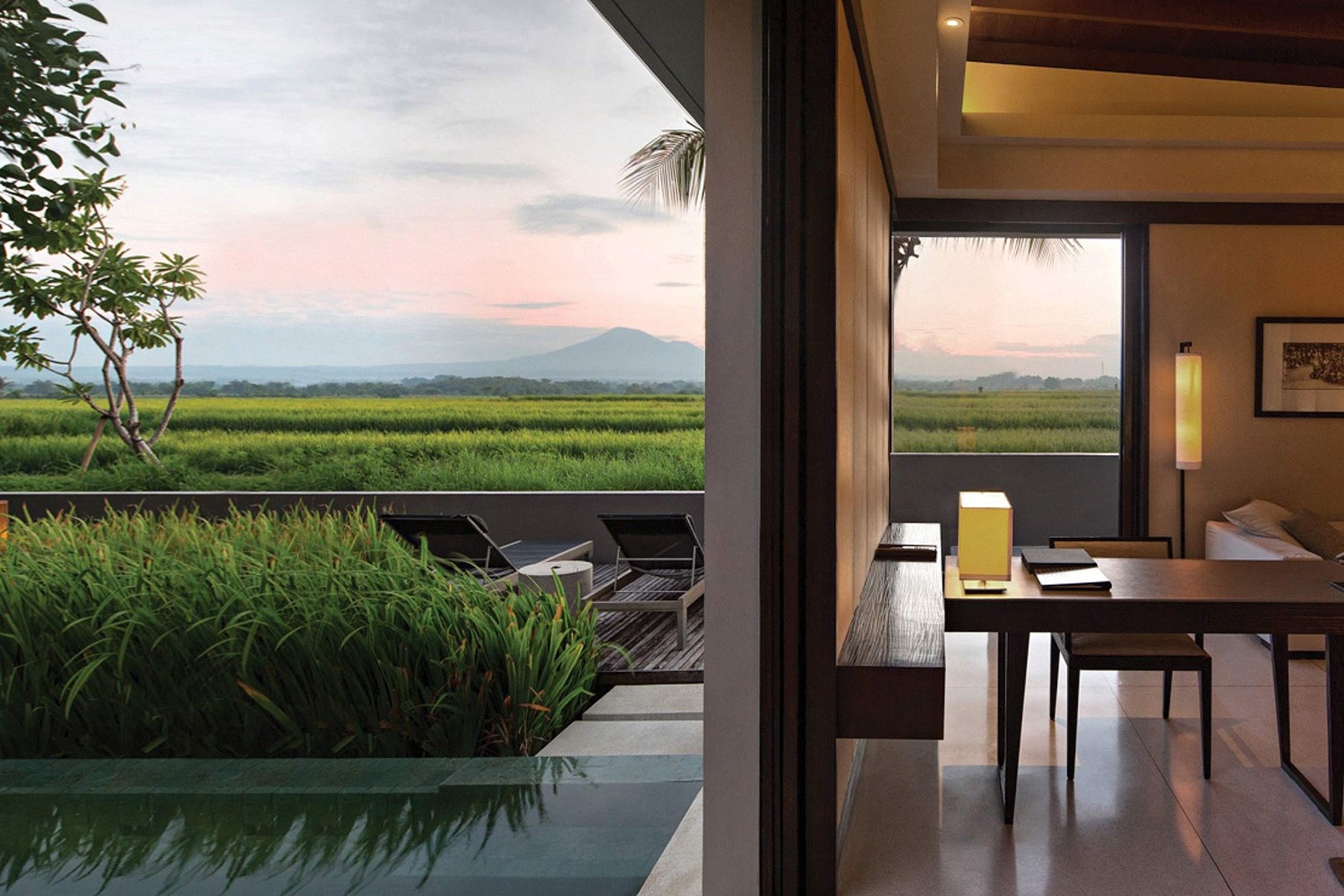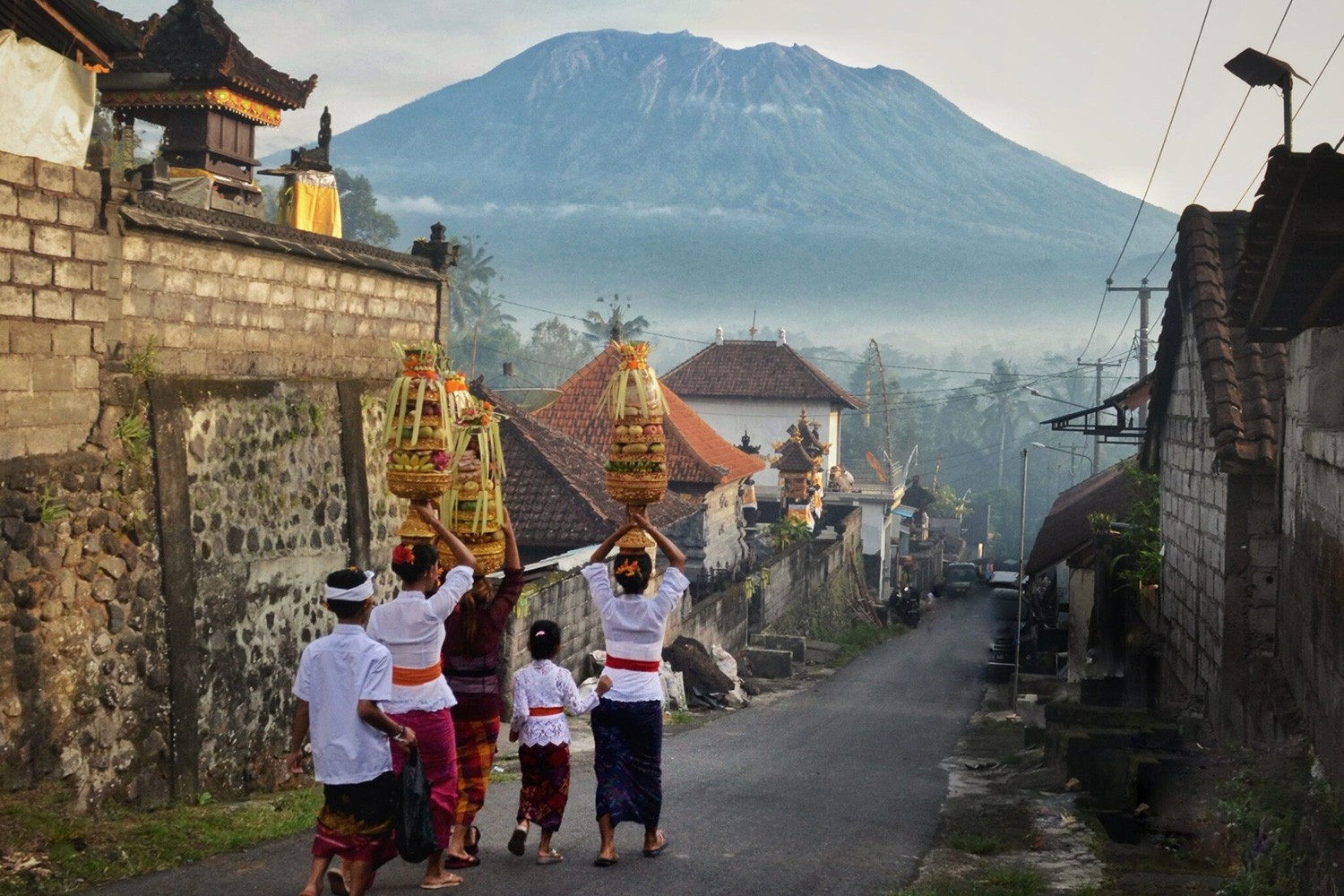NORTH STARS:
Community Support
Wildlife Ecosystems
Production & Consumption
Heritage Value
Certifications
Carbon Footprint
“Witnessing the damage inflicted from rapid development makes me fiercely protective of Bali.”
Living as a travel writer on one of the world’s most fascinating, yet rapidly over-touristed islands, I’ve become familiar with a certain push-and-pull. On one hand, I want to shout about Bali’s otherworldly beauty, its ancient culture, and the kindness of its people. On the other hand, witnessing the damage inflicted from rapid development — heavy traffic, noisy construction, and shrinking farmlands — makes me fiercely protective, wanting to keep Bali’s best secrets to myself if only to stem the constant flow of tourist traffic.
Discovering the quieter side of Bali coincided with meeting my husband. On our first date, we explored the island’s underrated east coast and its secluded snorkel spots, hidden beaches, and tucked-away temples. The life we’ve built here is filled with memories of these serene, out-of-the-way places.
There’s value in drawing attention to these lesser-known parts of Bali — not just because they’re more tranquil, but because some hotels in these areas actively support local communities and protect the environment through tourism-funded programs.
So if Bali’s been on your list, don’t worry — there’s plenty to explore beyond the crowds. Places that are just as beautiful, where your visit can help ensure the island and its people continue to thrive.

Soak up epic views at Samanvaya. Courtesy of Samanvaya.
Samanvaya in Sideman
North Stars: Community Support, Wildlife & Ecosystems, Production & Consumption
I believe Sidemen is the Bali people dream about — vast, verdant rice fields stretching as far as the eye can see, each dotted with farmers capped in traditional woven hats, and quaint villages far removed from the large-scale tourism to the south. Lately, it’s been dubbed “the new Ubud” for offering much of the same culture and charm, without the crowds.
Within this lush landscape, at the foothills of the imposing Mount Agung volcano, is Samanvaya, an adults-only boutique resort designed for those seeking quiet and cultural connection. Beyond its stylish villas and infinity pools overlooking terraced farms, the resort is deeply committed to responsible tourism.
Through its Support Sidemen initiative, Samanvaya funnels resources into the local community, supporting schools, organizing environmental clean-ups, and providing direct assistance to rice farmers. Guests can witness firsthand the impact of their stay by participating in these initiatives, from visiting schools that benefit from the program to learning about rice farming techniques that have been passed down for generations.
My husband and I stayed in one of their bamboo villas, where we’d end each day by dunking in our private splash pool as the sky turned sherbet pink over the horizon. One afternoon, we ventured out to nearby Gembleng Waterfall — a local secret — where even at eight months pregnant, I was able to make the hike to the top thanks to a well-maintained staircase (with railings! Something unheard of in most of Bali). Once there, we cooled off beneath the rushing cascade and soaked in a natural pool with views over the waterfall into the valleys beyond.
In the evenings, the on-site Asri restaurant treats guests to elegantly plated dishes prepared from farmer-delivered sourced produce. For more casual afternoon fare, Citrus & Vine, a roadside café at the resort, serves up artisanal sourdough sandwiches, locally roasted coffee, and (my personal favorite) small-batch gelato.

Discover North Bali at Umah Lusa Pedawa. Courtesy of Umah Lusa Pedawa.
Umah Lusa in Pedawa
North Stars: Community Support, Heritage Value, Production & Consumption
The hills of North Bali can feel like a different island altogether. Not only is it much cooler, but compared to popular beach towns like Kuta and Seminyak, the highlands are quiet, mist-laced, and deeply connected to centuries-old Balinese traditions. Umah Lusa, a boutique resort in the mountains near Bali’s “twin lakes,” is built with these elements in mind.
Set on a sloping terrain of spice and coffee plantations, the architecture of Umah Lusa embraces ancient Balinese craftsmanship through the use of traditional joglo-style suites. Colorful floor tiles, hand-carved wooden panels and handwoven textiles adorn each room, all sourced exclusively from local artisans. You can feel the love and intention that went into each design choice for its six, standalone suites.
We stayed shortly after the resort opened in 2024, and for much of our visit, we were the only guests on the property. I spent slow mornings on the veranda, sipping coffee that’d been grown mere feet away, while the scent of clove trees spiced the air as I caught up on writing assignments. In the afternoon, I’d soak in the hot tub while my husband wandered their terraced garden trail, tempted by the pineapples, passion fruit and other delectables growing there to service its on-site restaurant.
Like Samanvaya, Umah Lusa’s farm-to-table restaurant also seeks to showcase the bounty of Pedawa’s agriculture. More than 80% of its ingredients come from local farmers. Guests are invited to visit Umah Lusa’s own half-hectare organic farm, where clove, vanilla, and coffee thrive alongside rows of vegetables and fruit trees. A short drive away, can’t-miss tastings at Kejapa Coffee Plantation allow guests to experience the depth of flavors grown in this region’s prized volcanic soil.
Beyond its F&B program, Umah Lusa provides some truly unique cultural immersion. Guests can watch traditional bamboo basket weavers at work in Tigawasa Village, or step back in time to visit one of Bali’s oldest traditional villages — barely influenced by modern life. After a day of exploration, there’s no better treat than watching the sun sink beyond the mountain valley and into the sea beyond.

A classic Bali rice paddy and mountain vista from the rooms at Soori Bali. Courtesy of Soori Bali.
Soori Bali in Tabanan
North Stars: Community Support, Certifications, Carbon Footprint
Though situated along Bali’s Southwestern coast, Soori Bali resort is located on a still-quiet beach several minutes north of the famous Tanah Lot temple. Being there feels like witnessing what Bali’s most well-known beaches must have been like decades earlier, before mass tourism brought them to their breaking point.
Created by architect Soo K. Chan, the resort was designed from day one with sustainability in mind. Villas are cooled by volcanic stone and natural ventilation rather than relying solely on air conditioning. Water-efficient appliances, a separation system for gardening and domestic water, and a commitment to using locally sourced materials ensure minimal environmental impact. These initiatives and more have helped the resort achieve the EC3 Global EarthCheck Standard for Building, Planning, and Design, the world’s largest certification program for sustainable travel and tourism businesses.
The setting here is postcard-worthy: tucked between rice paddies and the sea, with villas that open directly onto the shoreline. Guests love the peaceful pace — spending mornings at yoga, afternoons in the spa, and evenings savoring multi-course dinners from French chef Benoit. For families, thoughtful touches make for epic memories, like private barbecues in the villa courtyard or local children visiting to teach traditional dance.
The dance lessons are an extension of Soori’s contributions to its local community. Among many other initiatives, the resort hosts a fully-funded indigenous school for young children to preserve the centuries-old Legong Art of Balinese music and dance. Soori also provides English language classes at a local elementary school, and has established a scholarship program supporting students to pursue careers in hospitality.
Each of these destinations — Samanvaya, Umah Lusa, and Soori Bali — proves that tourism in Bali doesn’t have to come at the cost of its people or environment. By staying in places that actively give back, travelers can feel a world away from Bali’s bustle yet more connected to the island than ever. These hidden retreats offer more than just a quiet getaway; they provide an opportunity to be part of a more sustainable future for Bali.

Bonnie is a Bali-based freelance writer specializing in a more eco-conscious brand of luxury travel, design, style and wellbeing. Her bylines to-date include Azure Road, Elle UK, BBC Travel, Artful Living, Upscale Living, BLLNR, Well + Good, The New Zealand Herald and many others. For more from Bonnie, you can subscribe to her Substack or follow Bonnie on IG @eco.luxury.bon.



